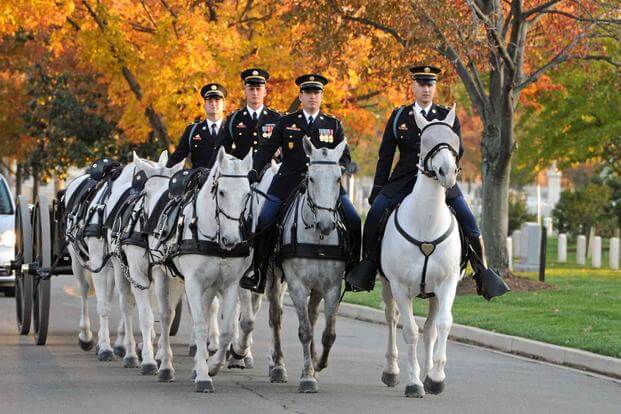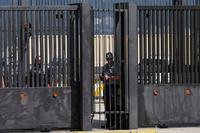Four military working horses in the Army's 3rd Infantry Regiment, also known as The Old Guard, have died since February including two since October, a string of deaths that follows an investigation into how horses are treated by the unit.
Two of the horses died within about a month of each other -- the latest occurring a day after Thanksgiving. The first pair of deaths occurred within 96 hours of each other in February.
Those first deaths led to a wave of public and congressional attention at The Old Guard and the way it treats its herd, specifically after CNN reported that they were living in small, unsanitary lots, consuming low-quality feed and suffering from parasites -- issues that the unit said it has attempted to remedy.
Read Next: Veterans Groups Press for Long-Shot Expansion of GI Bill Eligibility for Guard and Reserves
The Old Guard told Military.com on Friday that the most recent deaths are unrelated and also not connected to deaths in February, but a spokesperson for the unit said that the number of equine deaths that occurred this year is "not common." Previous members of the unit also said that four successive deaths -- three of which appear to be related to gut conditions -- are worrying.
"It's alarming to me," Eugene Burks Jr. told Military.com on Friday. Up until his retirement this summer, Burks was the Caisson platoon's equine facilities and equipment manager and leathersmith for over 20 years; he also spent years in the unit as an enlisted soldier, adding up to roughly four decades of experience with the herd.
"I have never, ever experienced this amount of horses going down," he said.
Rio, a 19-year-old horse, died on Oct. 24 and Rambler, a 14-year-old horse, died a month later. Both were euthanized by veterinarians as a result of their ailments.
The horses belonged to a unit within The Old Guard called the Caisson platoon, a specialty element tasked with carrying fallen service members to their final resting places at Arlington National Cemetery. There are roughly 60 horses in the platoon at any given time.
Roughly half of the horses in the unit were over 20 years old -- or geriatric -- as of April.
The unit posted on Facebook three days after Rambler's death, stating that he died from an "intestinal issue." Both horses that died in February also were euthanized following the diagnosis of gut issues. One was found with 44 pounds of gravel in his stomach.
A spokesperson for the unit told Military.com that Rambler's death "was unrelated to the previous military working horse deaths."
"The acute abdominal distress was related to a large colon volvulus (twisted gut) which cut off all blood circulation to tissue in the colon leading to tissue death," the spokesperson told Military.com via email on Friday, referring to Rambler.
"We are awaiting results of the necropsy," the spokesperson added.
Rio, who was nearing geriatric age, died from surgery complications after he suffered a "closed" front left limb fracture in March.
The unit performed three surgeries on Rio attempting to remedy the fracture, but in October -- roughly seven months after his initial injury -- his health declined and was euthanized "due to concerns about Rio's continued comfort and his ability to live a pain free life," The Old Guard spokesperson told Military.com last month.
Burks and another former employee of The Old Guard who has worked extensively with the herd, questioned why the unit kept Rio alive for so long with an injury that often results in a quicker decision to euthanize.
The Old Guard spokesperson told Military.com in October that, before Rio succumbed to complications, he was "healing well."
"It's just an absolutely miserable process for the horse," the former employee said, referring generally to the process of mending a leg break or fracture.
The former employee also told Military.com that such a large number of deaths occurring in such a short period of time is unprecedented in their experience. The former employee said the deaths likely have less to do with the day-to-day feeding and maintenance of the horses -- which they say is steady -- but rather with years-long systematic problems in the unit that are now coming to a head.
"We've had other deaths through my time there," the former employee told Military.com on Friday, "it just never happens this close together," adding particular emphasis that out of the four deaths, three were gut-related issues.
The Army's Public Health Command-Atlantic report in February, found that the herd was living and working in pastures and lots with nearly two feet of mud and excrement, eating low-quality, "dry, dusty, and brittle" hay, and that up to that point, the unit had received 18 "unsatisfactory" environmental reports since 2019.
The unit has previously told Military.com that it had made improvements to the herd's conditions in the wake of the CNN report, including reducing the parasite load and adding mats to the ground so the military working animals do not accidentally "lip" -- or ingest -- gravel when their hay may slip out of feeders and onto the ground.
"The loss of our teammates, including Rambler, has been particularly challenging, as our equine force is part of our military family and their care is our top priority," The Old Guard spokesperson told Military.com, adding that while the number of deaths were uncommon for the unit, "they can happen in any large equine operation."
But Burks said that he believes systematic errors in reporting and quickly identifying issues in the horses should be scrutinized.
"The thing is, horses colic," Burks said, referring to a general term for a painful abdomen issue that horses can experience. "It's what they do, and there's no way around it. It's how they respond to it when it happens and if the soldiers know what to do, how to identify it and what to do once they know that he's colicing -- that's where your problem lies."
Some members of Congress continue to show concern for the herd as efforts to make improvements work their way through the Capitol via the National Defense Authorization Act.
Specifically, lawmakers are looking at the undersized area that the roughly sixty-horse herd resides and trains in, which is less than 20% of the space that the American Association of Equine Practitioners endorses.
"It is shameful they don't have the space they need for the care of their horses," Sen. Tommy Tuberville, a Republican from Alabama and member of the Senate Armed Services Committee, told Military.com via email Friday.
"I know every member of the Caisson Platoon loves their animals and treats them with care. But for far too long these soldiers and their horses have been shoved into a forgotten corner of their base," he added. "That's going to change. We are going to make sure the no-fail mission of the Old Guard is given the priority it deserves."
A spokesperson for the Senator's office told Military.com that Tuberville included a "bipartisan provision" to the SASC's version of the NDAA which would require the secretary of the Army, Christine Wormuth, to implement changes to the herd's conditions based on equine veterinary findings.
The spokesperson added that the senator remains optimistic that the provisions will make it to the final version of the legislation.
"Senator Tuberville believes these provisions will require the Army to make significant changes at Fort Myer and Fort Belvoir to create cleaner, larger, safer living conditions for the Old Guard horses that reflect the importance of the mission they fulfill," the spokesperson said. "The death of four of the Caisson Platoon's horses in just nine months should highlight the need for change."
Burks said he worried about the future of the herd.
"I really don't think it's going to stop," he said.
-- Drew F. Lawrence can be reached at drew.lawrence@military.com. Follow him on Twitter @df_lawrence.
Related: Arlington's Caisson Horses Still Lack Space and Sanitary Conditions, Alabama Senator Says












